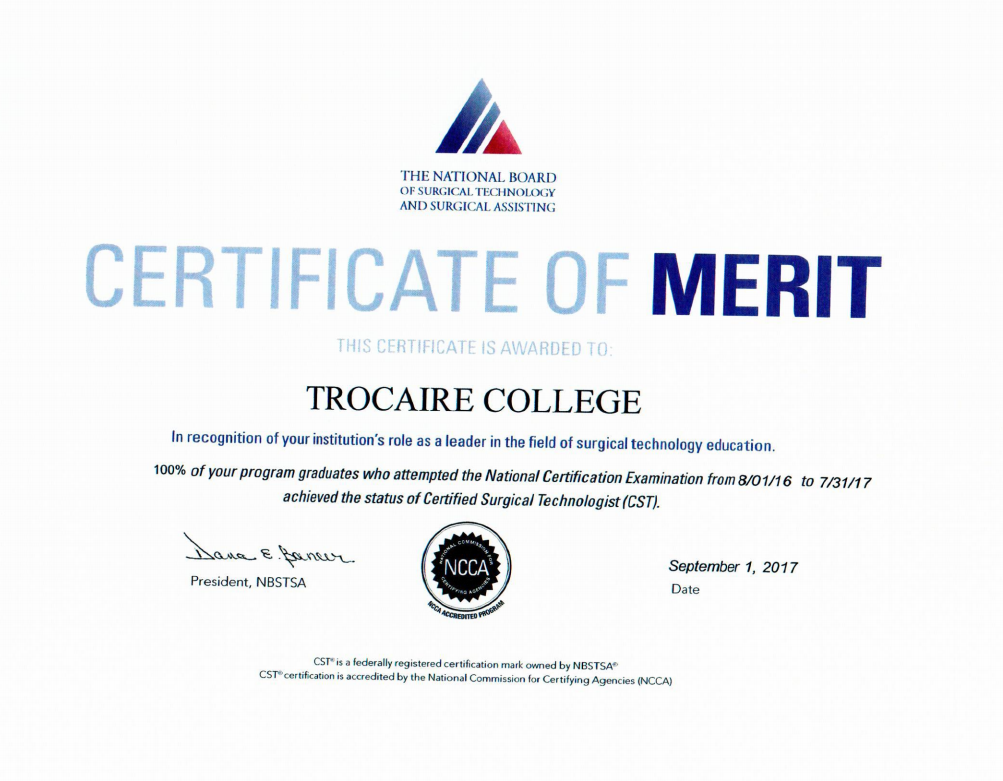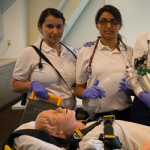What is a Surgical Technologist?
After the patient and the surgeon, the Surgical Technologist is the most important person in the room.
This is because they are responsible for all of the equipment and tools used for the operation.
It is the job of the Surgical Technologist to make sure all things in the operating room are sterilized and prepared for the patient and surgeon.
You could also consider a Surgical Technologist a surgeon’s right-hand man, as they are responsible for handing all of the instruments to the surgeon, as well as counting them before and after operations.
Duties
A Surgical Technologist is responsible for many things pre- and post-operation.
Since the Surgical Technologist is the first person to enter the operating room, they are responsible for sterilization.
Not only that, but they are required to do tasks like:
- Gather all equipment and tools
- Sterilize, count, and arrange everything
- Help prepare medications for administration
- Assist in retracting tissues from the patient
- Pass surgical tools to the surgeon
- Count all of the tools and instruments again
- Suture incisions and sterilize the area
- Dispose of all used items
Salary
Most Surgical Technologists that work in the United States will make about $48,530 a year.
Having a degree and earning a certification can mean a bigger salary, up to $75,940 a year in some areas.
Those who work in smaller populations or are just beginning their career can expect a salary closer to $36,930 to $40,000 a year.
Beginning a career in a larger population will typically allow for a higher salary.
This is due to the number of patients needing surgery, smaller towns don’t get as many people in and out of the building.
Those working as Surgical Technologists in places like New York will make more on average than someone working in New Hampshire.
Annually National Average Salary: $65,810
Average Annual Salary by State
| State | Avg. Annual Salary |
|---|---|
| Alabama | $49,440 |
| Alaska | $75,930 |
| Arizona | $69,300 |
| Arkansas | $55,840 |
| California | $83,240 |
| Connecticut | $77,760 |
| Delaware | $61,160 |
| District of Columbia | $69,950 |
| Florida | $59,840 |
| Georgia | $61,610 |
| Hawaii | $71,350 |
| Idaho | $63,630 |
| Illinois | $70,320 |
| Indiana | $62,610 |
| Iowa | $54,950 |
| Kansas | $57,120 |
| Kentucky | $53,280 |
| Louisiana | $53,990 |
| Maine | $63,120 |
| Maryland | $67,190 |
| Massachusetts | $77,630 |
| Michigan | $61,710 |
| Minnesota | $77,190 |
| Mississippi | $50,560 |
| Missouri | $63,250 |
| Montana | $59,240 |
| Nebraska | $63,040 |
| Nevada | $74,330 |
| New Hampshire | $67,430 |
| New Jersey | $71,270 |
| New Mexico | $56,720 |
| New York | $75,950 |
| North Carolina | $58,670 |
| North Dakota | $58,600 |
| Ohio | $61,600 |
| Oklahoma | $57,050 |
| Oregon | $78,460 |
| Pennsylvania | $64,840 |
| Rhode Island | $67,360 |
| South Carolina | $56,900 |
| South Dakota | $53,430 |
| Tennessee | $58,170 |
| Texas | $62,940 |
| Utah | $66,370 |
| Vermont | $63,860 |
| Virginia | $67,890 |
| Washington | $74,880 |
| West Virginia | $49,560 |
| Wisconsin | $67,710 |
| Wyoming | $57,890 |
| Puerto Rico | $28,330 |
Annual Average Salary: Top 5 States
The top earning state in the field is California, where the average salary is $83,240.
These are the top 5 earning states in the field:
* Employment conditions in your area may vary.
How to Become a Surgical Technologist
Step 1 Earn an Associates Degree
Having an Associate’s degree as a Surgical Technologist will be important.
This degree shows employers that you are competent in the career and that you understand the intricacies of the job.
Most Associates degrees in the United States take around two years to complete.
You can expect a surgical technician program to contain many science and math classes, as well as courses like:
- Medical Terminology
- Surgical Technology
- Surgical Procedures
- Pharmacology
It is likely that you will also need to take classes such as English and psychology in order to fulfill requirements.
It’s possible to earn a degree online, but make sure that all of your lab work and any internships are done in person.
The main goal of lab work and internships is to get the Surgical Technologist working in the environment before they are hired, so take as many opportunities to demonstrate your knowledge as you can get while still in school.
Step 2 Become Certified
After earning an Associate’s degree, there are some certifications that can make it easier to gain employment or even promotions and raises.
The National Board of Surgical Technology and Surgical Assisting offers the Certified Surgical Technologist credential.
In order to be eligible for this certification, you must have graduated from an accredited degree program.
This certification requires an exam, which is multiple choice and ranges from 150 to 175 questions.
Results can take 4-6 weeks to get back to you, but once you pass the exam you will be considered a Certified Surgical Technologist.
Another accredited association, the National Health Career Association, offers the Operation Room Surgical Technician Certification.
This credential also requires that you take a multiple-choice exam.
Having certification as a Surgical Technologist can help you gain employment.
Step 3 Gain Experience
Since you can become certified as a Surgical Technologist as soon as you graduate from a program, most employers like to hire those with certification first.
Another important factor in whether you become employed is if you have experience in the field.
Most Surgical Technologists will have lab experience as well as internship experience.
There are many Surgical Technologists who get hired at the facility where they performed their internship.
However, if you want to look elsewhere, there are many places to consider.
It’s possible to find a job in places like:
- Hospitals
- Private clinics
- Surgery centers
- Cosmetic surgery clinics
Step 4 Continue Your Education
Once you have a couple of years of experience as a Surgical Technologist, you may want to continue your education to learn more or even move on to another career.
Some ways to continue your education would be to obtain a Bachelor’s degree.
Or, some Surgical Technologists choose a specialty and begin learning more about that area of surgery.
With more education, you can become the first assistant on a surgical team.
The first assistant has more operational duties during the surgery than a Surgical Technologist.
Other opportunities could include:
- Perioperative nursing
- Surgical Assistant
- Management
- Medical equipment supply salesman
- Physician’s assistant
Having a formal education is important in this career, but hands-on experience is crucial to learning everything you need to know to become a successful Surgical Technologist.
Popular Programs
Education
You won’t be able to find employment as a Surgical Technologist unless you have an Associate’s degree from an accredited university or other association.
An Associate’s degree program for surgical technicians can take around two years to finish, which includes lab work and an internship before graduation.
It’s even possible to earn a degree online nowadays.
You will learn many things in a surgical technology program, including courses like:
- Surgical Procedures
- Anatomy and Physiology
- Surgical Theory
- Medical Terminology
- Culture and Diversity
It is likely that you will be required to take college-level math classes, as well as other elective classes.
Whether you study online or in a classroom, it’s necessary to do lab work and your internship in person to gain hands-on experience.
With an Associates degree in surgical technology, you can expect to gain employment in areas such as:
- Inpatient hospital operating rooms
- Outpatient surgery centers
- Emergency rooms
- Clinics
After working as a Surgical Technologist for a couple of years, it’s possible that you may be looking to advance your education.
A Bachelor’s degree can be a step toward gaining more knowledge as well as promotions and raises.
Most Bachelor’s degree programs take about four years to finish, however, there are many schools that will apply credits from an Associate’s degree.
In a surgical technology Bachelors program, it is typical to take courses like:
- Human Diseases
- Principles of Epidemiology
- Health Promotion
- Organization and Administration in Health Services
It’s likely that you will have to take elective classes in this degree program as well.
Other things to consider are lab work and any internships or fieldwork that must be done during a Bachelor’s degree program.
This degree will focus mainly on surgical procedures and the implementation of those procedures.
Once you earn a Bachelor’s degree, there are many career opportunities that can open up.
From becoming a first assistant on a surgical team to working in management, education and experience will get you far in this career.
Video About The Career
Certification
Earning certification is optional for Surgical Technologists, however, it can help you gain employment and stand out compared to other Surgical Technologists.
There are several associations that are accredited to provide certification to Surgical Technologists.
These associations are:
- The National Board of Surgical Technology and Surgical Assisting
- The National Health Career Association
- The National Center for Competency Testing
The National Board of Surgical Technology and Surgical Assisting offers the Certified Surgical Technologist credential.
In order to be eligible for the Certified Surgical Technologist certification, you must:
- Have proof of graduation from an accredited degree program
- Have proof of graduation from a military training program
- Pay $200
This exam consists of 150-175 multiple choice questions and can take up to three hours to finish.
After passing the exam, you must become recertified every 3 years.
This can be done by retaking the exam or showing proof of further education.
From the National Health Career Association, comes the Operating Room Surgical Technician certificate.
In order to be eligible for this certification, you must meet one of the following requirements:
- Have graduated from an accredited program
- One year of experience working in the field
- Military experience in the field
This certification is also earned by taking an exam.
This exam is given throughout the United States at different testing sites, more information can be found on the association website.
Lastly, the National Center for Competency Testing offers the Tech in Surgery certification.
The Tech in Surgery certification requires that you be a current student or a recent graduate of a surgical technology program.
You must also pay the $155 testing fee.
This certification also requires an exam, which is multiple choice.
Some of the topics found on the exam include:
- Preoperative care and prep
- Intraoperative care and prep
- Postoperative care and prep
By passing these exams and gaining certification, you are showing employers that you are knowledgeable and you are showing patients that you know what you are doing when you are assisting with their surgery, and they can trust you to take good care of them.
Certification Example:

Average Training Program Duration: 2-4 Years
Most training programs to become a Surgical Technologist take about two years.
This is because there is so much to learn about the medical field and surgery.
These programs will likely require lab work and internships, making the course take longer.
When learning to become a Surgical Technologist, it’s wise to enroll in a two-year program.
Accelerated programs may leave out important information.
Job Outlook
If you are looking to start a career as a Surgical Technologist, now is the time to get started.
This career will grow around 9 percent over the next decade, much more than several other careers in the medical field.
Those who have certification and advanced education will likely be able to find employment over those with no credentials.
The rise in job opportunities is due to the advancements in technology, as well as the aging baby boomer population.
Not only does this generation require more medical care, but they are also retiring from the workforce, opening up even more jobs.
Employment Growth Projection: 6%
2023
2033
That's a higher than average projected growth of 6,500
Should You Become a Surgical Technologist?
Overall Satisfaction: High

Most Surgical Technologists feel that they have a high-stress job, but the career has great work to home life balance.
This career also shows promising promotions and raises, especially for those with credentials.
Earning a certificate or gaining more education allows Surgical Technologist to earn more money, which causes greater satisfaction.
Having a career as a Surgical Technologist will be demanding physically and mentally, so having stamina will create better satisfaction.
Medical terminology education and knowledge of the medical field will also help in how much a Surgical Technologist enjoys their career choice.
Average Salary: High

On average, a Surgical Technologist in the United States makes $48,530 a year.
When you just begin a career in this field, you should expect to make closer to $36,930 a year to begin.
However, after many years of experience, continued education, and promotions, it’s possible to earn $75,940 a year as a Surgical Technologist.
Many Surgical Technologists who work in large hospitals or in higher populations will make more money than those working in smaller populations.
A Surgical Technologist working in California makes on average $62,000 a year, while a Surgical Technologist in Idaho makes about $48,000 a year.
Job Growth Outlook: High

When looking for a career as a Surgical Technologist, the chances of finding employment should increase by about seven percent over the next decade.
This means that more jobs will be available than ever, which can be due to several reasons.
Advancements in medical technology have made surgeries easier and made more surgery types possible.
Along with that, the aging population, which will require more medical care, will likely require elective surgeries as well, like hip replacements and other cosmetic surgeries.
Education Duration: 2-4 Years

Most employers require a Surgical Technologist to at least possess an Associate’s degree.
This is to show the competency level of the Surgical Technologist.
There are some employers that only require a certificate, which takes about a year to complete.
On average, an Associate’s degree from a community college or university can take around two years to finish.
With certification, it can take anywhere from 3-4 years to become a Surgical Technologist.
However, there are those who choose to earn a Bachelor’s degree, which can add another four years to your education.
Personal Skills Needed

Not only should you have knowledge of the medical field as a Surgical Technologist, but it’s also important to be well organized and meticulous as well.
Should you find yourself interested in this career, there are some personal skills that are required in order to be a success:
- Ability to work with others
- Calm nature
- Excellent communication skills
- Great dexterity
- Ability to handle blood and other bodily fluids
- Willingness to learn
- Dedication to the craft
- Reliability
- Anticipation skills
- Accountability
- A good sense of humor
Frequently Asked Questions
How much does a Surgical Technologist make?
Most Surgical Technologists make around $33,000 to $48,530 when just beginning their careers.
With continued education, certification, and experience, a Surgical Technologist in the United States makes about $50,220 a year.
Those who have many years of experience can expect a higher salary, closer to $75,940 a year or more.
Having relevant degrees and certifications will allow you better employment opportunities, promotions, and even career advancement in other areas.
How long does it take to become a Surgical Technologist?
There are many different programs for those who are interested in this field of work.
On average, it takes about two years to finish a program, though there are some one-year programs available.
If you are interested in earning an Associate’s degree, this can take two years as well.
A Bachelor’s degree can lead to career advancement but will take another 2-4 years depending on the school you attend.
It can take about 2 years to become a Surgical Technologist.
What does a Surgical Technologist do?
A Surgical Technologist will assist the surgeon with surgery, as well as prepare all of the instruments and the operating room.
This career is very meticulous and requires someone with great attention to detail.
As a Surgical Technologist, you will be the first one in the operating room to make sure that the surgeon has everything they need to perform surgery.
You will also hand instruments to the surgeon throughout surgery and help with finishing up the operation.
What is the demand for Surgical Technologists?
People will always need surgery, and thanks to advancements in technology, it has become even easier to perform different types of surgeries.
This means that there will always be a need for Surgical Technologists.
This career will grow around 9 percent over the next ten years, which means that if you are looking to advance your career, now is the time.
Those with an Associate’s degree or certificate will likely find employment easier than those with no formal education.
How much does it cost to become a Surgical Technologist?
Since most Surgical Technologists earn an Associate’s degree, the cost can range anywhere from $10,000 to $30,000 depending on the school attended.
Most certifications cost anywhere from $175 to $200, and there are a number of certifications available to Surgical Technologists.
Having a Bachelor’s degree can add to a cost of $30,000 to this career.
Those who are interested in working as a Surgical Technologist should expect to pay anywhere from $10,000 to $40,000 to become one.
 Surgical Technologist Info by State
Surgical Technologist Info by State

- Alabama
- Alaska
- Arizona
- Arkansas
- California
- Colorado
- Connecticut
- Delaware
- Florida
- Georgia
- Hawaii
- Idaho
- Illinois
- Indiana
- Iowa
- Kansas
- Kentucky
- Louisiana
- Maine
- Maryland
- Massachusetts
- Michigan
- Minnesota
- Mississippi
- Missouri
- Montana
- Nebraska
- Nevada
- New Hampshire
- New Jersey
- New Mexico
- New York
- North Carolina
- North Dakota
- Ohio
- Oklahoma
- Oregon
- Pennsylvania
- Rhode Island
- South Carolina
- South Dakota
- Tennessee
- Texas
- Utah
- Vermont
- Virginia
- Washington
- West Virginia
- Wisconsin
- Wyoming
Surgical Technologist Resources
- 10 Tips for Taking the NBSTSA Surgical Technology Exam
- 6 Reasons To Become a Surgical Technologist
- How Long Does it Take to Become a Surgical Tech Through an Accelerated Program?
- Online Surgical Technologist Training Programs
- Surgical Technologist vs. Sterile Processing Technician
- Surgical Technologists vs. Surgical Assistants
- Surgical Technology Certifications – CST (NBSTSA), TS-C (NCCT)
- The Average Salary For a Surgical Technologist
- The Cost of Becoming a Surgical Technician
- The Pros and Cons of a Career in Surgical Technology
- What Does a Surgical Technologist Do?
- What is a Surgical Technologist and Where Can This Career Take Me?
- What is a Typical Work Day Like for a Surgical Technologist?
- What You Need to Know Before Sitting for Your Surgical Tech Certification Exam
- Working as a Traveling Surgical Tech
More Medical Careers
| Career | |
|---|---|
 | Certified Nursing Assistant Working as a Certified Nursing Assistant is an entry-level role that will give you hands-on experience when you are ready to take the next step in your medical career. |
 | Dental Assistant Dental assistants help dentists to provide patient care, keep records, and care for the dental equipment. |
 | Dental Hygienist Dental hygienists take care of cleaning teeth to promote hygiene and help avoid cavities and gum problems. |
 | Dialysis Technician Dialysis technicians maintain and monitor dialysis equipment, and also act as primary caregivers for patients undergoing dialysis treatment. |
 | Dog Groomer Dog groomers attend to grooming dogs, usually at dog salons or big pet-related chain stores. |
 | Healthcare Administrator Healthcare administrators – also known as healthcare executives or health services managers – are responsible for the planning, direction, and coordination of medical and health services. |
 | Home Health Aide Home health aides provide home care to individuals who require assistance in their day-to-day living. |
 | Licensed Practical Nurse (LPN) Licensed Practical Nurses provide basic nursing care to patients and work with Registered Nurses and Doctors. |
 | Medical Assistant Medical assistants support the work of physicians, nurses, and other health professionals. |
 | Medical Biller and Coder Medical billers and coders manage, organize, and code various health information data. |
 | Medical Technologist Medical laboratory technologists collect bodily samples and conduct tests to analyze those samples. |
 | Medical Transcriptionist Medical transcriptionists go over voice recordings to convert them into written texts. |
 | Nutritionist As a Nutritionist, you’ll be tasked with creating meal plans, counseling, and understanding dietary restrictions for all types of clients. |
 | Patient Access Representative The work involves helping people to orient themselves to the space and everything that is going on. |
 | Patient Care Technician Patient care techs work directly with patients helping them with daily activities and assist the medical staff by measuring and monitoring the patients' vital signs among other tasks. |
 | Pharmacy Technician Pharmacy technicians provide patients with medications through prescription or over the counter. |
 | Phlebotomist As a Phlebotomist, it will be your responsibility to take blood samples from patients and send them to the lab for further testing. |
 | Physical Therapist Assistant Physical therapist assistants provide physical therapy services to patients and aide to physical therapists. |
 | Professional Recovery Coach A professional recovery coach is a life coach who works with someone during their addiction recovery process. |
 | Radiation Therapist Allied health provisional who specializes in radiation oncology treatments. |
 | Registered Health Information Technician Registered Health Information Technician (RHIT) help store and verify accuracy of health records as well as analyze patient data. |
 | Registered Nurse (RN) Registered Nurses provide hands-on patient care in various settings, mainly hospitals, and clinics. |
 | Respiratory Therapist Respiratory therapists treat and care for patients who experience breathing difficulties. |
 | Sterile Processing Technician A sterile processing technician is a healthcare professional who is responsible for preparing, sterilizing, maintaining, packaging, and storing medical tools and equipment used in surgical and other medical procedures. |
 | Vet Office Manager Veterinary office managers work to make sure that the daily operations run smoothly and efficiently at veterinary hospitals or veterinary clinics. |
 | Veterinary Assistant Veterinary Assistants work closely with Veterinarians to handle routine animal care. |
 | Veterinary Technician Veterinary Technicians assist veterinarians as well as diagnosing and treating animals, mostly in private clinics. |
 | EKG Technician EKG technicians test and monitor the cardiovascular system. |
 | EMT Trained emergency medical technician that arrives at the scene to provide medical services such as resuscitation. |
 | MRI Technologist MRI Technologists use a machine to scan the body and create a detailed image of the inside for doctors to analyze. |
 | Optician Opticians are technicians and salespersons at the same time who spends most of their day talking to customers, reading prescriptions written by doctors, and dispensing glasses and lenses. |
 | Ultrasound Technician Ultrasound technicians aid physicians in monitoring and diagnosing patients through the use of ultrasonic imaging technology. |
 | X-Ray Technician X-Ray Technicians are medical imaging professionals who use technology to visualize the inside of our bodies. |














